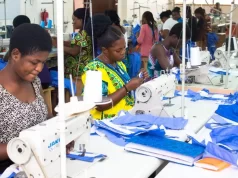By Juliet ETEFE
The Secretary-General of the African Continental Free Trade Area (AfCFTA),Wamkele Mene has called for the deepening of intra-African trade to enhance the continent’s self-sufficiency.
In his speech at the 2024 Ghana Economic Forum (GEF), the Secretary-General emphasized the shared challenges faced by African nations, including global financial pressures, supply chain disruptions and the lingering effects of COVID-19. These factors, he said, have collectively strained Africa’s economic resilience.
He acknowledged that Africa’s economic outlook is overshadowed by concerns over sovereign debts, persistent inflation, climate risks and political uncertainties.
However, he expressed hope that AfCFTA, a vital tool for re-engineering Africa’s economic model, if comprehensively implemented, will help member countries overcome the aforementioned challenges.
He highlighted AfCFTA’s role in deepening intra-African trade to reduce dependency on global markets, citing the continent’s sharp decline in exports during the COVID-19 pandemic as evidence.
“In all of these challenges that the continent faces, I believe there is a solution as we seek to re-engineer Africa’s economic model. That solution is the AfCFTA. You will recall that in 2020, Africa’s exports to the rest of the world dropped by over 35 percent due to the COVID-19 pandemic and global market shutdowns.
This should serve as a wake-up call for us, Africans, to deepen intra-African trade to achieve self-sustenance as a continent,” he stated.
He outlined three key areas for re-engineering Africa’s economic model: industrial development, food security through agricultural development, and reform of trade policies.
On industrial development, he called for enhanced production capacity, particularly in pharmaceuticals and the automotive sector. He praised recent efforts led by the African Union to establish vaccine manufacturing capabilities in Rwanda, Ghana, Senegal and South Africa, thereby creating a continental value chain for pharmaceutical production.
He also underscored the potential of Africa’s automotive sector, which is projected to generate US$45 billion in investment opportunities by 2035.
Regarding food security, he stressed the need to transition from being a net food importer—Africa imported over US$50 billion worth of food in 2020—towards leveraging the continent’s vast agricultural resources. He urged African countries to adopt trade policies that prioritize intra-continental trade in agricultural products, reducing reliance on imports from outside the continent.
Trade policy reform.
He also underscored the importance of re-engineering Africa’s trade policy through the AfCFTA, which aims to establish a common trade policy and market across the continent.
He advocated for the adoption of key protocols on trade in goods, competition policy, investment, intellectual property rights, and digital trade, emphasizing these as crucial steps towards establishing a unified and competitive African market.
The Secretary-General expressed confidence that these measures would enhance Africa’s competitiveness, create jobs and eliminate long-standing trade barriers.
He concluded his speech by urging African leaders and stakeholders to persist in their efforts to make the AfCFTA a dynamic instrument that drives the continent’s economic transformation.

















